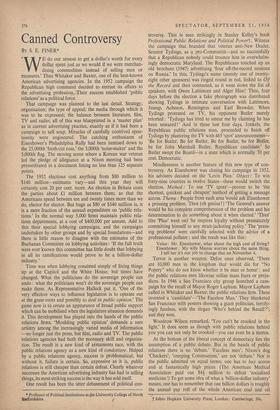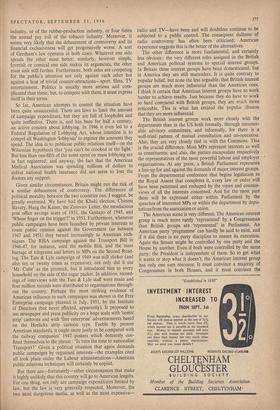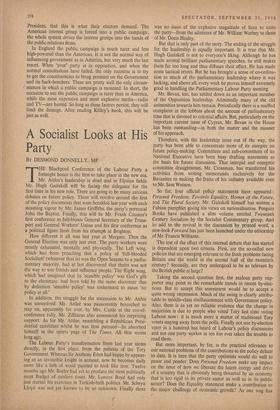Canned Controversy
BY S. E. FINER* E do our utmost to get a dollar's worth for every dollar spent just as we would if we were merchan- dising commodities instead of selling men or measures.' Thus Whitaker and Baxter, one of the best-known American advertising agencies. In the 1952 campaign the Republican high command decided to entrust its affairs to the advertising profession. Their success established 'public relations' as a political force.
That campaign was planned to the last detail. Strategy; organisation; the type of appeal; the media through which it was to be expressed; the balance between literature, film, TV and radio; all of this was blueprinted in a 'master plan' as in current advertising practice, exactly as if it had been a campaign to sell soap. Miracles of carefully contrived spon- taneity were engineered. The catching enthusiasm of Eisenhower's Philadelphia Rally had been itemised down to the 25.000th `fresh-cut rose,' the 3,000th `noise-maker' and the 5,000th flag. The moving scene where a Korean war veteran led the pledge of allegiance at a Nixon meeting had been premeditated in a document listing no less than 125 separate points.
The 1952 elections cost anything from $80 million to $140 million—estimates vary—and this year they will certainly cost 20 per cent. more. An election in Britain costs the parties about £1 million between them; so that the Americans spend between ten and twenty times more than we do, elector for elector. But huge as $80 or $140 million is, it is a mere fraction of the annual expenditure on 'public rela- tions.' In the normal way 5,000 firms maintain public rela- tions departments, at a cost of $400,000 per annum. Add to this their special lobbying campaigns, and the campaigns undertaken by other groups and by special foundations—and there is little reason to disagree with the estimates of the Buchanan Committee on lobbying activities : 'If the full truth were ever known this committee has little doubt that lobbying in all its ramifications would prove to be a billion-dollar industry.'
Time was when lobbying consisted simply of fixing things up at the Capitol and the White House; but times have changed. What the politicians do the sovereign people can undo : what the politicians won't do the sovereign people can make them. As Representative Halleck put it, 'One of the very effective ways to influence legislation is to operate out at the grass roots and possibly to deal in public opinion.' The game now is to create an appearance of broad public support which can be mobilised when the legislature situation demands it. This development has played into the hands of the public relations firms. 'Moulding public opinion' deMands a sure artistry among the increasingly varied media of information —no longer just the press, but film, radio and TV. The public relations agencies had both the necessary skill and organisa- tion. The result is a new kind of armaments race, with the public relations agency as a new kind of condottiere. Helped by a public relations agency, success is problematical; but without it, failure is certain. So, expensive as it is, public relations is still cheaper than certain defeat. Clearly whatever successes the American advertising industry has had in selling things, its most striking success is the way it has sold itself.
One result has been the Utter debasement of political con-
• Professor of Political Institutions at the University College of North Staffordshire.
troversy. This is seen strikingly in Stanley Kelley's book Professional Public Relations and Political Powert . Witness the campaign that branded that veteran anti-New Dealer, Senator Tydings, as a pro-Communist—and so successfully that a Republican nobody could trounce him in overwhelm- ingly democratic Maryland. The Republicans touched up an old brochure (1947) advertising 'four off-the-record sessions on Russia.' In this, Tydings's name (merely one of twenty- eight other sponsors) was ringed round in red, linked to Off the Record and then connected, as it went down the list of speakers, with Owen Lattimore and Alger Hiss! Then, four days before the election a fake photograph was distributed showing Tydings in intimate conversation with Lattimore, Jessup, Acheson, Remington and Earl Browder. When Tydings protested on TV, his opponent Butler merely retorted : `Tydings has tried to smear me by claiming he has been smeared !' And in these last four days, Jonkels, the Republican public relations man, proceeded to finish off Tydings by plastering the TV with 465 'spot' announcements— `Be for Butler, Be for Butler, Be for Butler, be for Butler, be for John Marshall Butler, Republican candidate.' So Butler swept the Board—in a state which is normally 70 per cent. Democratic.
Mindlessness is another feature of this new type of con- troversy. As Eisenhower was closing his campaign in 1952, his advisers decided on the 'Levin Plan.' Object : To win forty-nine counties in twelve States—these would switch the election. Method : To use 'TV spots'—proven to be 'the shortest, quickest and cheapest' method of getting a message across. Theme : People from each area `would ask Eisenhower a pressing problem. Then (oh genius!) 'The General's answer would be his complete comprehension of the problem and his determination to do something about it when elected.' Thus' (the 'Plan' went on) 'he inspires loyalty without prematurely committing himself to any strait-jacketing policy.' The 'press- ing problems' were carefully selected with the advice of a professional pollster : and the result was like this : Voice : Mr. Eisenhower, what about the high cost of living? Eisenhower : My wife Mamie worries about the same thing. I tell her it's our job to change that on November 4.
Terror is another weapon. Defoe once observed, 'There are 10,000 men in the kingdom that would die for "No Popery" who do not know whether it be man or. horse' : and the public relations men likewise utilise mass fears or preju- dices. In 1946 a San Francisco city group launched a cam- paign for the recall of Mayor Roger Lapham. Mayor Lapham called in Whitaker and Baxter, the public relations firm. These invented a `candidate'—`The Faceless Man.' They blanketed San Francisco with posters showing a giant politician, terrify- ingly faceless, with the slogan 'Who's behind the Recall?'; and they won.
Woodrow Wilson remarked, 'You can't be crooked in the light.' It does seem as though with public relations behind you you can not only be crooked—you can even be a moron.
At the bottom of the liberal concept of democracy lies the assumption of a public debate. But in the hands of public relations there is no `debate.' Faceless men'; Nixon's dog `Checkers% 'creeping Communism,' are not 'debate.' Nor is the public admitted on equal terms; one has to buy access and at fantastically high prices. (The American Medical Association paid out $41 million to defeat 'socialised medicine.') To get some idea of what a 'billion-dollar industry' means, one has to remember that one billion dollars is roughly the annual pay roll of the whole American coal and oil
I Johns Hopkins University Press; London: Cumberlege, 36s. industry, or of the rubber-production industry, or four times the annual pay roll of the tobacco industry. Moreover, it seems very likely that the debasement of controversy and its financial exclusiveness will get progressively worse. A sort of Gresham's law operates in both cases. Whatever one side spends the other must better; similarly, however simple, feverish or comical one side makes its arguments, the other must sink still further. Furthermore, both sides are competing for the public's attention not only against each other but against a host of trivial counter-attractions—sport, films, TV entertainment. Politics is usually more serious and com- plicated than these; but, to compete with them, it must express itself in their terms.
So far, American attempts to control the situation have been quite unsuccessful. There are laws to limit the amount of campaign expenditure, but they are full of loopholes and quite ineffective. There is, and has been for half a century, an active concern about lobbying. In 1946 it even led to a Federal Regulation of Lobbying Act, whose intention is to compel all Washington `lobbyists' to register the amounts they spend. The idea is to publicise public relations itself—on the Wilsonian hypothesis that 'you can't be crooked in the light.' But less than one-fifth of the sums spent on mass lobbying are in fact registered; and anyway, the fact that the American Medical Association was spending millions of dollars to defeat national health insurance did not seem to lose the doctors any support.
Given similar circumstances, Britain might run the risk of a similar debasement of controversy. The differences of political morality between the two countries can, I suggest, be greatly overrated. We have had the Khaki election, Chinese Slavery, Hang the Kaiser, the Zinoviev Letter, the mendacious post office savings scare of 1931, the Gestapo of 1945, and `Whose finger on the trigger?' in 1951. Furthermore, whenever public campaigns have been launched by private interests to rouse public opinion against the Government (as between 1947 and 1951) they turned increasingly to American tech- niques. The RHA campaign against the Transport Bill in 1946-47, for instance, used the mobile film, and the mass barrage of telegrams and letters to MPs on the Second Read- ing. The Tate & Lyle campaign of 1949 was still slicker (and also ten or twenty times as expensive); not only did it use `Mr. Cube' as the gimmick, but it introduced him to every household on the side of the sugar packet. In addition, record- ings of interviews with the Tate & Lyle staff were made and four million records were distributed to organisations through- out the country. Perhaps the most striking evidence of American influence in such campaigns was shown in the Free Enterprise campaign planned in July, 1951, by the Institute of Directors (but never effected, apparently). It proposed to use newspaper and press publicity on a huge scale with 'comic strip' cartoons and with 'free enterprise' advertisements based on the Horlicks strip cartoon type. Feeble by present American standards, it ought more justly to be compared with the railway companies' 1947 posters which demurely con- fined themselves to the phrase : 'ls THIS the time to nationalise Transport?' Given a political situation that again demands public campaigns by organised interests—the examples cited all took place under the Labour administrations—American public relations techniques will certainly be copied.
But there are—fortunately—other circumstances that make it highly unlikely that this country will go to American lengths. For one thing, not only are campaign expenditures limited by law, but the law is very generally respected. Moreover, the two most dangerous media, as well as the most expensive- radio and TV—have been and will doubtless continue to be subjected to a public control. The consequent dullness. of radio controversy has often been criticised; American experience suggests this is the better of the alternatives.
The other difference is more fundamental, and certainly less. obvious : the very different roles assigned in the British and American political systems to special interest groups. In Britain these interest groups have been domesticated. but in America they are still marauders. It is quite contrary to popular belief, but none the less arguable, that British interest groups are much more' influential than the American ones. I think it certain that American interest groups have to work harder to achieve results. Just because they do have to work so hard compared with British groups, they are much more noticeable. This is what has created the popular illusion that they are more influential.
The British interest groups work more closely with the departments than in the US both formally, through innumer- able advisory committees, and informally, for there is a well-tried pattern of mutual consultation and co-operation. Also, they are very closely tied in with the Commons. This is the crucial difference. Most MPs represent interests as well as constituents; and also, the parties encapsulate respectively the representatives of the most powerful labour and employer organisations. At any point, a British Parliament represents a line-up for and against the demands of major interest groups. From the departmental conference that begins legislation to the Royal Assent that completes it, every law or order will have been patterned and reshaped by the views and counter- views of all the interests concerned. And for the most part these will be expressed either within Parliament by the speeches of interested MPs or within the department by depu- tations from the association or union.
The American scene is very different. The American interest group is much more rarely 'represented' by a Congressman than British groups are 'represented' in Parliament. An American party 'programme' can hardly be said to exist, and if it did there is no party discipline to ensure its execution. Again the Senate might be controlled by one party and the House by another. Even if both were controlled by the same party, the President is independent of them. So to get what it wants or stop what it doesn't, the American interest group has only one sure resource. It must convince a majority of Congressmen in both Houses, and it must convince the President, that this is what their electors demand. The American interest group is forced into a public campaign; the whole system drives the interest groups into the hands of the public relations firms.
In England the public campaign is much rarer and less high-powered than the American. It is not the normal way of influencing government as in America, but very much the last resort. When 'your' party is in opposition, and when the normal consultations have failed, the only recourse is to try to get the constituencies to bring pressure on the Government and its back-benchers. These are pretty well the only circum- / stances in which a public campaign is mounted. In short, the occasion to use the public campaign is rarer than in America, while the most expensive and most explosive media—radio and TV—are barred. So long as these factors persist, they will limit the damage. After reading Kelley's book, this will be just as well.




































 Previous page
Previous page